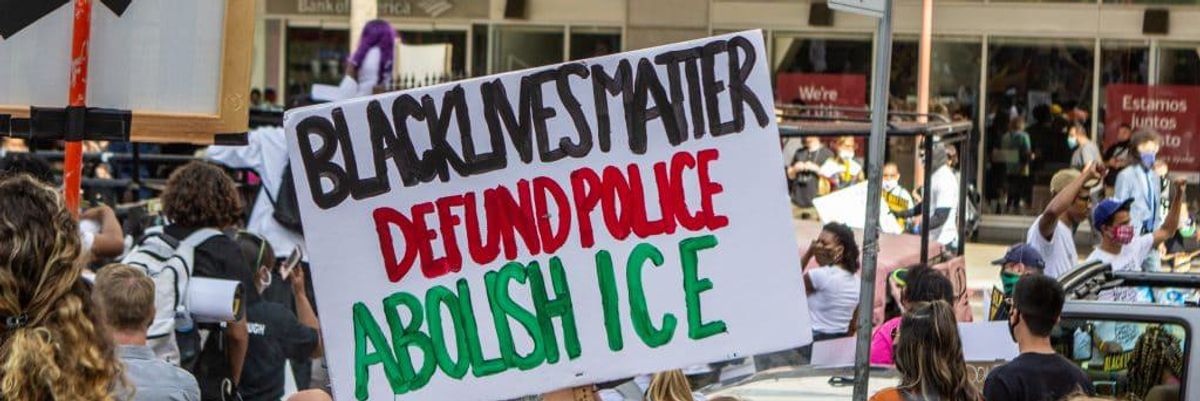Why Defunding the Police is Necessary to Stop Immigration Detention and Deportation

On May 28, Minneapolis’ Third Police Precinct went up in flames, a symbol of the righteous anger over the deaths of George Floyd, Breonna Taylor, Ahmaud Arbery and countless others; anger over the fact that surveilling, detaining, and killing Black people has been baked into American policing, starting with its earlier iteration: slave patrols. On June 26, the Minneapolis City Council voted to advance a November ballot measure that would remove the Police Department from the City Charter and replace it with a Department of Community Safety and Violence Prevention that would employ a “holistic public health-oriented approach.” Rage brought clarity: the police are not required for communities to remain safe.
These calls to defund the police are necessary, and should also include defunding resources that police dedicate to profiling, arresting, and detaining individuals for the purposes of transferring them to U.S Immigration and Customs Enforcement (ICE) custody. Ending collaborations between local law enforcement and ICE is critical to preventing any more unnecessary deaths of people of color from two of their deadliest foes: COVID-19 and law enforcement brutality.
Multiple sheriffs, including in conservative counties, have rescinded their 287g agreements with ICE, citing concerns over the spread of COVID-19 and civil rights violations stemming from their participation. What might be less clear for those concerned with humane immigration policy is the long history of ICE sweet-talking local law enforcement into doing its own job of enforcing federal immigration law. ICE does this through formal contracts with local law enforcement called 287g agreements, but also through informal partnerships where eager Sheriffs or Police Chiefs have volunteered their space, time, energy, and money to carry out ICE’s bidding. Despite being tasked with enforcing state and local laws, police departments across the country have long been empowered to enforce ICE’s sprawling detention and deportation scheme. Indeed, ICE simply does not have the personnel necessary to detain and deport as many individuals as it does today. ICE solves that problem by asking cops to step in. Seventy percent of individuals detained in ICE custody were transferred from the punishment system. Jail transfers are drivers of immigrant detention. Defunding police, the entity charged with bringing arrestees to jail, is one necessary step towards stopping immigration detention and deportations.
ICE empowering local law enforcement to enforce federal immigration law opens the door to constitutional violations like racial profiling. Although ICE has done away with 287g street task force agreements that allowed local law enforcement to unilaterally make immigration related arrests, laws like the “show me your paper” provisions of SB1070 in Arizona still exist. Arizona has gained infamy for one Sheriff in particular who was so dedicated to racial profiling and collaborating with ICE that he violated a court order to continue doing so. Considering the dark history of police as a band of individuals tasked with kidnapping runaway enslaved people, communities should be hesitant to think that local law enforcement could ever determine people’s immigration status without insidious racial profiling.
As COVID-19 cases are spiking to unprecedented levels, there has never been a more urgent time for sheriffs to do their part to stop the spread within their jails. This could be done by removing ICE presence from jails, stopping jail transfers and ending information sharing with ICE. Sheriffs are not obligated to honor ICE’s detainers and can release individuals they suspect of being undocumented after they have served their time or have their charges dropped. COVID-19 has provided an opportunity for the public to re-examine the alleged purpose of immigration detention centers and jails: to ensure individuals show up to their court dates. Studies have consistently shown that people, in immigration and criminal contexts, appear in court of their own volition.
Sheriffs should not expend limited local resources on unnecessary ICE transfers and instead should allow these individuals to safely social distance at home. Anytime that local law enforcement aids an ICE transfer from their custody, they create dangerous, unnecessary and avoidable interactions that increase the risk of COVID-19 exposure for all involved. Indeed, ICE has confirmed over 3,000 cases of COVID-19 within its facilities, three detainees have died due to the virus, and at least one guard at a private contractor facility has died. The New York Times and the Marshall Project have called ICE out for being an irresponsible spreader of COVID-19, both domestically and abroad, particularly in Guatemala, El Salvador and Honduras.
The viral video of George Floyd’s murder at the hands of police shone a light once again on the lethal oppression that Black, indigenous, people of color face for daring to exist. People simply do not need to be in cages and we must defund the entities responsible for patrolling the streets and placing them there.


 Google search of “latino person” shows mostly brown and lighter-skinned people.
Google search of “latino person” shows mostly brown and lighter-skinned people.

